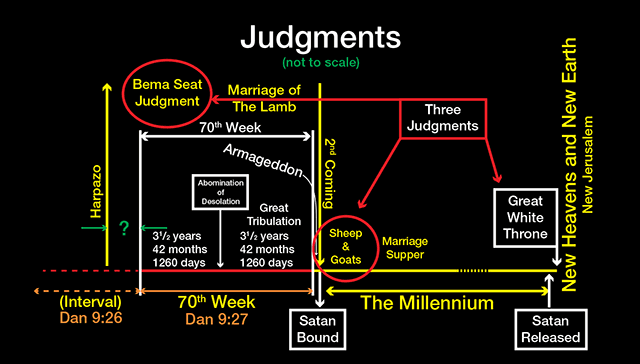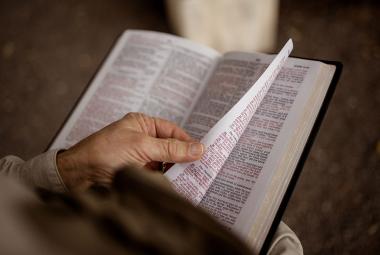There are three principal judgments that are often confused: the Bema Seat Judgment, the Sheep and Goat Judgment, and the Great White Throne. They are each quite different.
They say experience is a hard teacher because it gives the test first and the lessons afterward. However, we have ample lessons in life well in advance of our final exam. Paul has given us numerous written guides to help us prepare for it.[1]
Yet we all do have a last “final exam” still ahead of us: “We must all appear before the Bema seat of Christ…”[2] And every day that our Lord tarries gives us an additional day to prepare for it.
What is the “Bema seat”? Where will it be held? When is it given? What is at stake? What are the grading criteria?
The Bema Seat
This judgment is often taught as simply an awards ceremony, but that is not entirely correct. It was the tribunal seat, the judicial bench, the judgment seat, or throne of the one in charge. Herod Agrippa I addressed the people of Tyre and Sidon from his Bema seat.[3] Jesus was brought before Pilate[4] and his Bema seat. Paul was accused before Proconsul Gallio;[5] and brought before Festus at Caesarea[6] facing a Bema seat. (A relic of one was found among the ruins in Corinth.)
There are three principal judgments that are often confused: the Bema Seat Judgment, the Sheep and Goat Judgment, and the Great White Throne. They are each quite different.
The Bema Seat[7] deals with rewards for obedience, crowns, and the call of the Bride to the Marriage of the Lamb which occurs in the Father’s house.
The Sheep and Goat Judgment[8] is on the earth. Three separate parties are involved, and mortals are judged on the basis of their “works.”
The Great White Throne[9] occurs at the end of the Millennium, deals with the unsaved dead, and ushers in the New Heavens, the New Earth, and the New Jerusalem.
These are all highlighted in figure 1 below.

The Bema Seat Judgment is apparently the first order of business for the translated saints after the Harpazo. Everyone present will be “saved;” salvation is not the issue here. (That was concluded on a wooden cross erected in Judea about 2,000 years ago!) Everyone present will have been saved by the completed work of our Lord Jesus. The issue here is fruit-bearing, not salvation.
All are building on the same foundation, but with vastly differing results.
According to the grace of God which is given unto me, as a wise masterbuilder, I have laid the foundation, and another buildeth thereon. But let every man take heed how he buildeth thereupon. For other foundation can no man lay than that is laid, which is Jesus Christ.
— 1 Corinthians 3:10,11 (KJV)
“Let every man take heed:” A solemn warning. We are God’s Building. We are only subcontractors.
The evaluation procedure is then detailed:
Now if any man build upon this foundation gold, silver, precious stones, [or] wood, hay, stubble;
— 1 Corinthians 3:12 (KJV)
Notice that there are six commodities in two groups, in descending order of worth. Three are products of a God’s creative act, not growth or development; three are the result of natural growth and development (from our old nature?).
The first three are permanent. The last three will perish under fire. (The largest load of hay or wood would be worth less than the smallest diamond.)
Every man’s work shall be made manifest: for the day shall declare it, because it shall be revealed by fire; and the fire shall try every man’s work of what sort it is.
— 1 Corinthians 3:13 (KJV)
Also, notice that the “work” is being appraised, not the person. It is the work being tested by fire, not the individual. All are building on the same foundation, but the results are vastly different.
If any man’s work abide which he hath built thereupon, he shall receive a reward.
— 1 Corinthians 3:14 (KJV)
Rewards, not salvation, are the issue. Among these rewards, five crowns may be included: the Crown of righteousness,[10] Crown of glory,[11] Crown of life,[12] incorruptible Crown,[13] and Crown of rejoicing.[14]
Salvation is invariably presented as a free gift;[15] rewards are earned by works (fruit-bearing).[16]
Salvation is a present possession;[17] rewards are a future attainment given by Him at His Coming.[18]
If any man’s work shall be burned, he shall suffer loss: but he himself shall be saved; yet so as by fire.
— 1 Corinthians 3:15 (KJV)
So you have been saved: what have you done with it?
That which is done for sake of personal gain, popularity, influence, or its impression on the world, will be for naught.[19]
Lot as an example
Lot was vexed daily[20]. Abraham was not vexed; he had separated himself from the world. God destroyed Sodom but saved Lot, “yet as by fire.” Everything he had lived for was burned up.
Tears in Heaven?
Why? (There will be no sin, no sickness, no death, nor lack of anything…)
“Of all the words of tongue or pen, the saddest are these: ‘it might have been.”
— John Greenleaf Whittier
When I take my life under review, I will be deeply distressed. Not for the sins I’ve committed: they have all been paid for by my Saviour. I will be distressed for the time and opportunities I’ve wasted; for the time frittered away on foolishness; for the people I might have helped; for the moments I lacked the courage to exploit for Him; etc., etc., etc…
Every day our Lord tarries is another day in which we may repair our own report cards.
Our Final Exam is rapidly approaching. What are you doing to prepare for it?
That’s what the Koinonia Track within the Koinonia Institute is intended for. Let us help you where we can.
In His Name,
Chuck
Notes:
- Romans, Galatians and Hebrews instruct and amplify Habakkuk’s fabled challenge in Habakkuk 2:4. ↩
- 2 Cor 5:10. ↩
- Acts 12:21. ↩
- John 19:13 (cf. Mt 27:19). ↩
- Acts 18:12, 16, 17. ↩
- Acts 25:6, 10, 17. ↩
- 2 Cor 5:10; 1 Cor 3:11–15. ↩
- Matt 25:31–46. ↩
- Rev 20:11–15. ↩
- 2 Tim 4:8. ↩
- 1 Pet 5:2–4. ↩
- Rev 2:10. ↩
- 1 Cor 9:25–27. ↩
- 1 Thes 2:19,20. ↩
- John 4:10; Rom 6:23; Eph 2:8, 9. ↩
- Matt 10:42; Luke 19:17; 1 Cor 9:24, 25; 2 Tim 4:7, 8; Rev 2:10; 22:12. ↩
- Luke 7:50; John 3:36; 5:24; 6:47. ↩
- Matt 16:27; 2 Tim 4:8; Rev 22:12. ↩
- John 15:16. ↩
- 2 Pet 2:8. ↩






